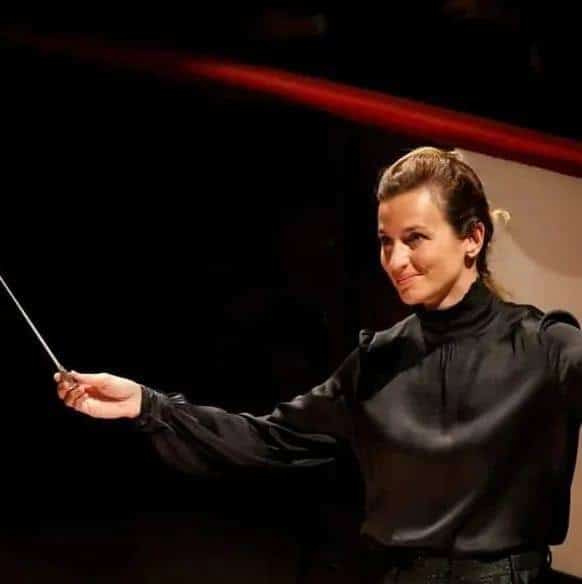Look, Peter Gelb: Young opera lovers…
main
This has just been posted by Angela Gjeorghiu, 45 minutes before an ROH Boheme screening in Trafalgar Square.


This has just been posted by Angela Gjeorghiu, 45 minutes before an ROH Boheme screening in Trafalgar Square.
The US violinist has announced she is still…

We gather that Juilliard has summarily fired a…

The Teatro Colón in Buenos Aires has appointed…

The Atlanta gadfly music critic Mark Gresham reviewed…

Session expired
Please log in again. The login page will open in a new tab. After logging in you can close it and return to this page.
Not sure I get your point. Should the Met big-screen a Boheme performance out in central park and young people will come? Would these young people, having seen a free broadcast, suddenly want to pay ROH prices for tickets?
“the change in the audience makeup over the past five years or so is quite remarkable: suddenly there are teenagers and students in their early 20s in every section of the theater, and even when full-priced ticket sales are low, the theater is full almost every night of the season.”
That is all very encouraging. Yet . . . with so many younger people in the audience, surely that should push the average age of audiences down. Then how is it Mr. Gelb broadcasts to the world that the average age is old and getting older?
It might be helpful to point out that the Royal Opera receives a public subsidy that, as of 2010, amounted to 43% of its income.
And in 2010 that subsidy amounted to £27 million (approx. $46 million). I’ll bet the ROH would be thrilled to abandon all that in favour of the $133.5 million+ the Met received that year from private donations! By a strange quirk of fate, that amount also happened to be approx. 43% of the Met’s expenditure!
And the Met Live in HD program brings the company to millions all around the country and beyond to people (who will likely never see the gold curtain live) for something like $20 a pop.
Can we please spell her name right?
Maybe it’s a different one.
I started going to opera when I was 18 and felt like an alien invader. The companies didn’t want to know young folk 20 years ago on account of their low spend: they have for years been reaping the punishment for that, but I think things are changing. Especially in continental houses, young folk are coming out in numbers and I’ve seen plenty of teenagers and 20 somethings in the stalls in Munich, where tickets in that area are rarely under €100.
All good points!
Peter Gelb’s problem is that the New York HATES his euro trash productions; he should elect a new public. Now we’re stuck with the worst Ring Production ever! And I never even had the chance to see the Schenk one! How depressing! Peter Gelb is the most disliked person with New York Opera lovers, he’s really killing the Met, and it’s not slowly.
The only good thing for me about Peter Gelb’s tenure is that most of the times his eurotrash productions are so empty that it’s really easy to get cheap tickets in the back for a student like me. Peter Gelb has affronted the New York public by basically saying that he doesn’t give a damn if we don’t like his stupid productions. That’s why he’s so detested.
Varis program is discontinued. After she died, no one took over. It also pissed off the subscribers who pay exhorbitant prices for their tickets.
In reply to Mr. Gelb’s neigh-saying opera, any CEO in a commercial business who went to the media to say his product is no longer in demand, without a plan to fix it, would be asked to leave, don’t let the door hit you in the rear.
Mr. Gelb has no real marketing bona-fides at his finger-tips. He dropped out of Yale after one year. His Father Arthur Gelb had used all suck he could to get Peter in. After he dropped out, he worked for Columbia Artists as an errand boy. He then came under the wing of Ronald Wilford, who has pimped him ever since. He got him a job as assistant manger at the BSO. He wasn’t responsible for marketing there, at that time, most of the house was sold out by subscription. Then he came back and managed the end of life career of Vladimir Horowitz. Not difficult, as the man did not play much, he was akin to a Hollywood assistant. Then he and Wilford went around the World twisting arms for the Berlin Philharmonic. They would go to the arts directorates for assorted countries and tell them they could have the Berlin Philharmonic and Herbert von Karajan if they would purchase video tapes. As HvK and CAMI were pocketing the money and the orchestra was receiving no financial benefit, there was a lawsuit, settled quietly. Gelb and Wilford were booked into a German jail at one point upon arrival until the matter was setttled. Then Wilford pimped Gelb for the Sony job. He touts the sales of Titanic, the real story is he turned the recording down several times and was told by his boss he had to release it. Then as we know, Gelb lost out in the Sony/BMG merger and Wilford went on bent knee to Bubbles to return a favor and hire Peter, as he was unemployed. Norman has a great account of this in his article “How the MET was Fixed” http://www.scena.org/columns/lebrecht/041111-NL-metopera.html
Essentially, Gelb’s marketing prowess is non existent, an utter waste of money. He has learned one lesson and that is, you list your singers in your literature, before your broadway directors and production team. That was a failed plan from the start and it took him 5 seasons to make that change.
It’s time to make a change in leadership at the Metropolitan Opera, this one is feckless and toothless.
Again I write to back up Save The Met’s comments.
In 1987 when Gelb was handling touring for Karajan and the Berlin Phil, a cancellation opened up after a tour to Tokyo and Osaka in April 1988. Taipei was suggested as a possible venue. Gelb then wrote to the Taiwan promoter:
“You would provide all-inclusive fees for von Karajan and the Orchestra, totaling [sic] 600,000 DM [$318,000] for a total of 2 concerts. In addition, you would be required to purchase the Taiwan broadcasting rights for 10 previously produced television programs of von Karajan and the Berlin Philharmonic or the Vienna Philharmonic at the price of 35,000 US dollars per program, hence totalling 350,000 US dollars for all ten programs. You would be required to purchase the 10 programs before the tour takes place, You would also be required to present us with an unconditional letter of credit for all the above fees no later than Nov. 1, 1987.” The Taiwanese rejected the “offer”.
All this was done without prior authorisation from either von Karajan or the Berlin Phil, according to Richard Osborne and quoted from his excellent biography “Herbert von Karajan: A Life in Music.” (pp 713/714). When the orchestra’s Intendant, Wolfgang Stresemann, heard of Gelb’s proposal to link tour concerts with commercial video airings that would bring far more profit to CAMI than the commission on the tour concerts alone, he described the deal as “immoral, unethical, impossible to imagine.”
One of the German magazines – I believe it was Stern – got hold of the story. On its next cover it featured a photo of von Karajan along with the headline “The Finance Manager”. It should have been Gelb on that cover.